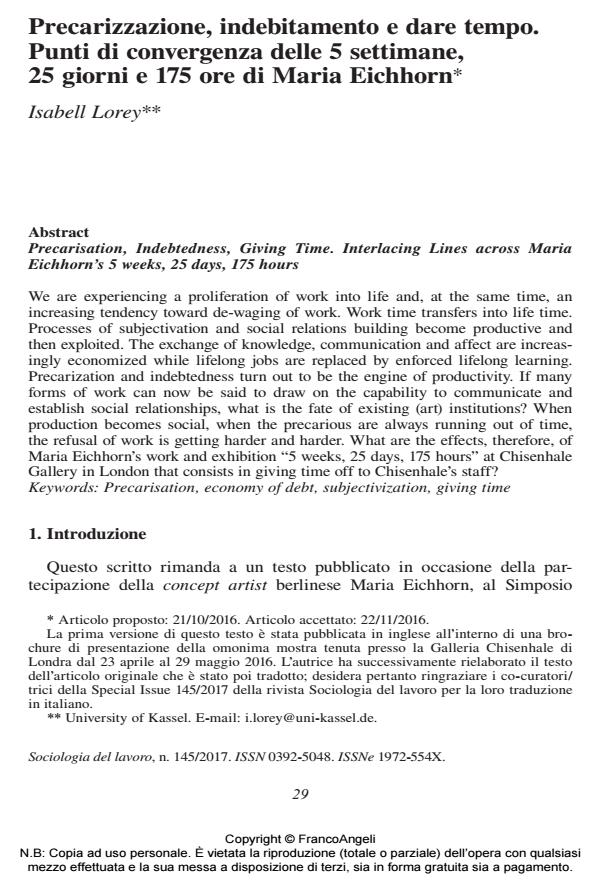Precarisation, Indebtedness, Giving Time. Interlacing Lines across Maria Eichhorn’s 5 weeks, 25 days, 175 hours
Journal title SOCIOLOGIA DEL LAVORO
Author/s Isabell Lorey
Publishing Year 2017 Issue 2017/145
Language Italian Pages 15 P. 29-43 File size 109 KB
DOI 10.3280/SL2017-145002
DOI is like a bar code for intellectual property: to have more infomation
click here
Below, you can see the article first page
If you want to buy this article in PDF format, you can do it, following the instructions to buy download credits

FrancoAngeli is member of Publishers International Linking Association, Inc (PILA), a not-for-profit association which run the CrossRef service enabling links to and from online scholarly content.
We are experiencing a proliferation of work into life and, at the same time, an increasing tendency toward de-waging of work. Work time transfers into life time. Processes of subjectivation and social relations building become productive and then exploited. The exchange of knowledge, communication and affect are increasingly economized while lifelong jobs are replaced by enforced lifelong learning. Precarization and indebtedness turn out to be the engine of productivity. If many forms of work can now be said to draw on the capability to communicate and establish social relationships, what is the fate of existing (art) institutions? When production becomes social, when the precarious are always running out of time, the refusal of work is getting harder and harder. What are the effects, therefore, of Maria Eichhorn’s work and exhibition "5 weeks, 25 days, 175 hours" at Chisenhale Gallery in London that consists in giving time off to Chisenhale’s staff?
Nel contesto odierno, assistiamo da un lato alla colonizzazione della vita da parte del lavoro e dall'altro, nello stesso tempo a una sua de-salarizazione. Il tem-po di lavoro si sovrappone quindi a quello della vita. I processi di soggettivazione e le relazioni sociali diventano produttivi e quindi investite dallo sfruttamento. Lo scambio della conoscenza, della comunicazione e dell'affetto tendono ad essere sempre più incorporate nella sfera economica mentre il lavoro di una vita viene sostituito da un eterno dover apprendere. In questo contesto, la precarizzazione e l'indebitamento diventano il motore della produttività. Se molte modalità lavorati-ve si basano su capacità comunicative e relazionali, qual è allora il destino dell'ar-te? Quando la produzione diviene sociale, quando il soggetto precario non ha più tempo, il rifiuto del lavoro diventa sempre più difficile. Quali sono dunque le con-seguenze del progetto di AMria Eichhorn e la sua esposizione concettuale "5 setti-mane, 25 giorni, 175 ore" alla Galleria Chisenhale di Londra, che consiste nel do-nare tempo al personale addetto?
Keywords: Precarisation, economy of debt, subjectivization, giving time
- Butler J. (2009). Frames of War. When Is Life Grievable? London/New York: Verso.
- Caffentzis G., Federici S. (2007). Notes on the edu-factury and Cognitive Capitalism. In: transversal: Knowledge production and its discontents, May. -- Avalaible at http://transversal.at/transversal/0809/caffentzisfederici/en.
- Cixous H. (1981). Castration or Decapitation? trans. Annette Kuhn, Signs. Journal of Women in Culture and Society, vol. 7, n. 1: 41-55.
- Corsani A., Lazzarato M. (2008). Intermittents et precaires. Paris: Editions Amsterdam.
- Derrida J. (1992). The time of the King, Given Time: I. Counterfeit Money. London, Chicago: University of Chicago Press.
- Desideri D., Harney S. (2013). Fate Work: A Conversation. Ephemera. Theory and politics in organization, vol. 13, 1: 159-176.
- Dowling E. (2016). Love’s Labour’s Cost: The Political Economy of Intimacy. -- Available from the web site: www.versobooks.com/blogs/2499-love-s-labour-scost-the-politicaleconomy-of-intimacy.
- Hardt M. (1999). Affective Labor. Boundary, 2, 26:2: 89-100.
- Harney S., Moten F. (2013). The Undercommons. Fugitive Planning & Black Study. London: Minor Compositions.
- Lazzarato M. (2012). La fabbrica dell’uomo indebitato. Saggio sulla condizione neoliberista. Roma: Derive Approdi.
- Lazzarato M. (2013). Il governo dell’uomo indebitato. Saggio sulla condizione neoliberista, Roma: Derive Approdi.
- Lorey I. (2006). Governmentality and Self-Precarization: On the Normalization of Culture Producers, trans. Dagmar Fink, Lisa Rosenblatt, transversal:
- Machines and Subjectivation. -- Available from the web site: http://eipcp.net/transversal/1106/lorey/en. Lorey I. (2014). Presentist Democracy: Exodus and Tiger’s Leap, trans. Aileen Derieg. --Avalaible from the web site: http://transversal.at/blog/Presentist-Democracy.
- Lorey I. (2015). Autonomy and Precarisation. In: Nico Dockx, Pascal Gielen, eds., Mobile Autonomy. Exercises in Artists’ Self-Organisation. Amsterdam: Valiz: 39-52.
- Lorey I. (2015). State of Insecurity. Government of the Precarious. London/New York: Verso.
- Lorey I., Neundlinger K. (2015). Kognitiver Kapitalismus. Von der Ökonomie zur Ökonomik des Wissens. Einleitung. In: Lorey I., Neundlinger K., eds., Kognitiver Kapitalismus. Wien, Berlin: Turia + Kant: 7-55.
- Marazzi C. (2011). The Violence of Finance Capitalism, trans. Kristina Lebedeva, Jason Francis Mc Gimsey. Los Angeles: Semiotext(e).
- Marx K. (1823). Estratti dal libro di James Mill “Eléments d’économie politique”, trad. par. J.T: Paris: Parisot. -- Avalaible from the web site: www.marxists.org/archive/marx/works/1844/.
- Nietzsche F. (1984). Genealogia della morale. Milano: Adelphi.
- Precarias a la deriva (2014). Was ist dein Streik? – Militante Streifzüge durch die Kreislaufevder Prekaritat, trans. Birgit Mennel, Vienna transversal texts.
- Raunig G. (2012). Fabbriche del sapere, industrie della creativita. Verona: Ombre Corte.
- Raunig G. (2016). Dividuum. Machinic Capitalism and Molecular Revolution, vol. 1, trans. Aileen Derieg. Los Angeles: Semiotext(e).
Isabell Lorey, Precarizzazione, indebitamento e dare tempo. Punti di convergenza delle 5 settimane, 25 giorni e 175 ore di Maria Eichhorn in "SOCIOLOGIA DEL LAVORO " 145/2017, pp 29-43, DOI: 10.3280/SL2017-145002